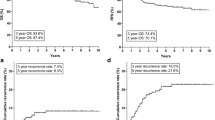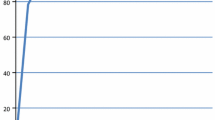Abstract
Rectal adenocarcinoma has been a major cause of death for patients with colorectal adenocarcinoma for decades. Local recurrence is common, but it is difficult to manage if the lesion is not detected early because of the limitations of radiotherapy and chemotherapy. Therefore, this study aimed to determine the risk factors of pelvic recurrence and promote early intervention. In this case series analysis, we reviewed the medical records of patients in our section of Taipei Tzu Chi Hospital who were diagnosed with rectal cancer from 2007 to 2016. We compared and analyzed the patients’ clinical characteristics, pathological stage, tumor location, recurrent type, and outcome. A total of 238 patients who were diagnosed and received surgical treatments within this period were included in this study. The median distance of the primary tumor from the anal verge was 8.63 cm. There were 59 patients with tumor recurrence and 15 with pelvic recurrence. Recurrence type was associated with tumor location, but it was not statistically significant (6.53 SD4.02 vs. 8.23 SD4.02 vs. 9.28 SD5.24 cm, pelvis vs. lung vs. liver, respectively). Only the initial carcinoembryonic antigen (CEA) level was significantly different; however, there was no difference in T and N stages. The initial CEA level can predict pelvic recurrence level, which is more obvious than pathological stage and tumor location, and this result can help predict oncological outcome. Further evaluations with more cases and using other cell tools are suggested.

Similar content being viewed by others
References
Administration HP, Welfare Moha, Taiwan. Cancer Registry Annual Report, 2016 Taiwan. 2018.
van Gijn W, Marijnen CA, Nagtegaal ID, Kranenbarg EM, Putter H, Wiggers T et al (2011) Preoperative radiotherapy combined with total mesorectal excision for resectable rectal cancer: 12-year follow-up of the multicentre, randomised controlled TME trial. Lancet Oncol 12(6):575–582
Sadahiro S, Suzuki T, Ishikawa K, Nakamura T, Tanaka Y, Masuda T et al (2003) Recurrence patterns after curative resection of colorectal cancer in patients followed for a minimum of ten years. Hepatogastroenterology 50(53):1362–1366
Pugh SA, Shinkins B, Fuller A, Mellor J, Mant D, Primrose JN (2016) Site and stage of colorectal cancer influence the likelihood and distribution of disease recurrence and postrecurrence survival: data from the FACS randomized controlled trial. Ann Surg 263(6):1143–1147
Westberg K, Palmer G, Hjern F, Johansson H, Holm T, Martling A (2018) Management and prognosis of locally recurrent rectal cancer - a national population-based study. Eur J Surg Oncol 44(1):100–107
Chari RS, Tyler DS, Anscher MS, Russell L, Clary BM, Hathorn J, et al. (1995) Preoperative radiation and chemotherapy in the treatment of adenocarcinoma of the rectum. Ann Surg. 221(6):778–86; discussion 86–7.
Bernstein TE, Endreseth BH, Romundstad P, Wibe A, Norwegian Colorectal Cancer R (2012) Improved local control of rectal cancer reduces distant metastases. Colorectal Dis 14(10):e668-78
Belli F, Sorrentino L, Gallino G, Gronchi A, Scaramuzza D, Valvo F, et al. (2020) A proposal of an updated classification for pelvic relapses of rectal cancer to guide surgical decision-making. J Surg Oncol.
Boysen AK, Wettergren Y, Sorensen BS, Taflin H, Gustavson B, Spindler KG (2017) Cell-free DNA levels and correlation to stage and outcome following treatment of locally advanced rectal cancer. Tumour Biol 39(11):1010428317730976
Visser O, Bakx R, Zoetmulder FA, Levering CC, Meijer S, Slors JF et al (2007) The influence of total mesorectal excision on local recurrence and survival in rectal cancer patients: a population-based study in Greater Amsterdam. J Surg Oncol 95(6):447–454
Heald RJ, Husband EM, Ryall RD (1982) The mesorectum in rectal cancer surgery–the clue to pelvic recurrence? Br J Surg 69(10):613–616
Garcia-Aguilar J, de Hernandez Anda E, Sirivongs P, Lee SH, Madoff RD, Rothenberger DA (2003) A pathologic complete response to preoperative chemoradiation is associated with lower local recurrence and improved survival in rectal cancer patients treated by mesorectal excision. Dis Colon Rectum 46(3):298–304
Wu S, Gu W (2019) Association of T stage and serum CEA levels in determining survival of rectal cancer. Front Med (Lausanne) 6:270
Funding
Funding for this study was provided by Taipei Tzu Chi Hospital, Buddhist Tzu Chi Medical Foundation (TCRD-TPE-108–12).
Author information
Authors and Affiliations
Corresponding author
Ethics declarations
Competing Interests
The authors declare no competing interests.
Additional information
Publisher's Note
Springer Nature remains neutral with regard to jurisdictional claims in published maps and institutional affiliations.
Rights and permissions
About this article
Cite this article
Lu, TJ., Chen, CW. & Hsiao, KH. Predictive Factors of Pelvic Recurrence After Treatment for Rectal Cancer. Indian J Surg 85, 274–279 (2023). https://doi.org/10.1007/s12262-022-03403-6
Received:
Accepted:
Published:
Issue Date:
DOI: https://doi.org/10.1007/s12262-022-03403-6




